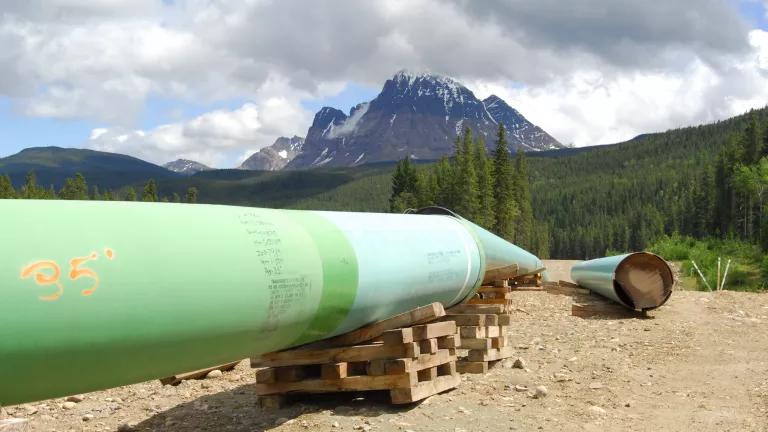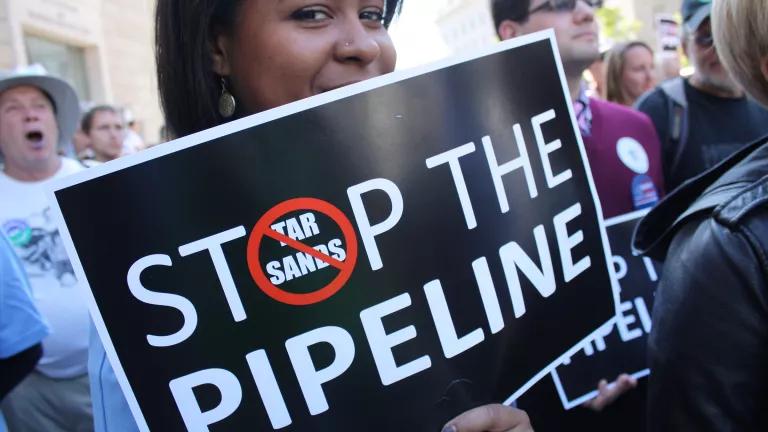Keystone XL Pipeline Lawsuits
Case Status
ActiveLast Update
Keystone XL is a massive, 830,000-barrel-per-day project that would have carried some of the world’s dirtiest crude oil—tar sands—across Montana, South Dakota, and Nebraska to refineries and export terminals on the Gulf Coast. Since it was proposed in 2008, the controversial pipeline has faced years of public protests and conflicting signals from the federal government. What remained unchanged was the project’s pervasive threats to climate, ecosystems, drinking water sources, and public health.
From his earliest days in office, President Trump pushed to restart construction following an earlier veto from the Obama administration. NRDC and our partners sued the Trump administration three times, preventing every illegal attempt to ram the project through until finally, in 2021, the newly elected Biden administration revoked Keystone XL’s cross-border permit. In June, TC Energy (formerly known as TransCanada, the project’s developer) announced it was abandoning the project for good.
Here’s a look back at the legal battles we fought—and where things stand now.
Bold Alliance et al. v. U.S. Department of the Interior et al.
On July 14, 2020, NRDC, Bold Alliance, Center for Biological Diversity, Friends of the Earth, and the Sierra Club filed a federal lawsuit challenging the Bureau of Land Management’s approval to construct the Keystone XL tar sands pipeline on approximately 44 miles of federally controlled public lands in Montana. The complaint also challenged the flawed environmental reviews by both the Bureau of Land Management and U.S. Fish & Wildlife Service—reviews that included the same errors and omissions as earlier versions that were ruled illegal by a federal court in 2018. The Indigenous Environmental Network, Rosebud Sioux Tribe, and Assiniboine and Sioux Tribes of the Fort Peck Reservation were also leading pending challenges to the dangerous pipeline project.
Our case was paused after TC Energy announced that it was abandoning its attempt to construct Keystone XL. Since then, TC Energy has been in the process of relinquishing the bureau’s right-of-way grant and other federal approvals. As one of the final steps in that process, TC Energy is currently removing the segment of the pipeline that it had constructed across the U.S.–Canada border and restoring the surrounding land.
Northern Plains Resource Council et al. v. U.S. Army Corps of Engineers et al.
On July 1, 2019, NRDC, together with the Northern Plains Resource Council, Bold Alliance, Center for Biological Diversity, Friends of the Earth, and the Sierra Club, filed a federal lawsuit challenging the U.S. Army Corps of Engineers’ issuance of a nationwide Clean Water Act permit that fast-tracks the approval process for utility projects and pipelines like Keystone XL to be built through our nation’s waterways.
In spring 2020, the court ruled in our favor and agreed that the agency unlawfully failed to evaluate threats to endangered species before issuing the permit. The court invalidated the permit’s use for all new oil and gas pipelines, including Keystone XL. While appeals from the court’s ruling were pending, we secured an important victory against Keystone XL when the U.S. Supreme Court declined a request from the Trump administration and TC Energy to allow the pipeline to use the permit and proceed with construction across hundreds of waterways while the appeal is being heard. The Supreme Court also issued a partial stay, pending appeal of the district court’s decision as it applies to other pipelines.
Thanks to this litigation, TC Energy was unable to obtain Clean Water Act authorization or construct Keystone XL through waterways prior to President Biden’s cancellation of Keystone XL’s cross-border permit and the project’s eventual abandonment. In August 2021, the U.S. Court of Appeals for the Ninth Circuit dismissed the appeals in the case as moot because the nationwide Clean Water Act permit had been replaced by a new version.
Northern Plains Resource Council et al. v. Shannon et al. (Closed)
In 2017, we launched a lawsuit against the U.S. Department of State for issuing a U.S.–Canada cross-border permit for Keystone XL based on a stale and incomplete environmental review. The federal court ruled in our favor in 2018 and halted construction of the pipeline until the State Department revised its analysis. While the court’s decision was on appeal, President Trump circumvented that ruling by revoking the State Department’s permit and issuing a new permit. In June 2019, the U.S. Court of Appeals for the Ninth Circuit dismissed this case as moot. This earlier litigation successfully prevented the project from being built based on flawed environmental reviews.
Related Content

What Is the Keystone XL Pipeline?

A Rubber Stamp on Keystone XL? Good Luck Persuading These Nebraskans

Biden's Rejection of Keystone XL Signals a New Era


